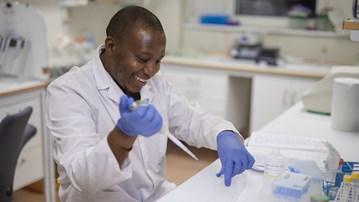Research group We use an experimental systems biology approach to study microbial infections.
Bacterial infections are linked to high human morbidity and death rates and antibiotic-resistant bacteria are becoming a more widespread concern. Aside from their virulence strategies, diverse bacterial pathogens are extremely capable of adapting to stressful host environments. They sense and respond to stressors by re-programming their transcriptome with complex regulatory networks for maintenance of infection. Therefore, bacterial stress responses can be potential targets for novel antimicrobial strategies. We aim to retrieve novel knowledge of bacterial tissue adaptation mechanisms and identify bacterial gene products which can be used as potential antimicrobial targets in combatting bacterial infections.
In comparison to working on one model microorganism, we believe working with diverse bacterial pathogens will give us deeper insights into similarities/discrepancies in adaptation of diverse bacterial pathogens. Conventional microbiology relies on standard microbiological assays that do not provide in depth information about biological processes involved in bacterial adaptation mechanisms. We develop novel tools in retrieving bacterial transcriptomes and employ next-generation sequencing and single cell transcriptomics to gain better understanding of gene regulatory networks.
Our experimental systems biology approach produces large transcriptomics and genomics data (currently), both from laboratory settings and directly from infected human specimens. We have revealed and analyzed gene expression of 32 human pathogens exposed to 11 infection-relevant conditions and collected all data in a searchable database, PATHOgenex constituting an excellent source for applications of systems biology approaches. Currently, our lab is focused on revealing transcriptomes of bacterial pathogens from infected human specimens, specifically infected prosthetic hip transplants, which are often polymicrobial and difficult to treat.
To dissect the complexity and extract important information from the in vitro and in vivo datasets, we apply experimental systems biology approaches. It allows us to integrate biological and medical sciences with mathematical and computational disciplines by employing advanced analytical approaches including network modeling, machine learning and data analytics.
The research is finaned by the Swedish Research Council, Insamlingsstiftelsen Medicinsk Forskning and Kempestiftelserna.
Avican K, Aldahdooh J, Togninalli M, Tang J, Borgwardt KM, Rhen M, Fällman M (2021) RNA Atlas of Human Bacterial Pathogens Uncovers Stress Dynamics Linked to Infection. Nature Comm 12:3282.
Schneiders S, Hechard T, Edgren T, Avican K, Fällman M, Fahlgren A, Wang H (2021) Spatiotemporal Variations in Growth Rate and Virulence Plasmid Copy Number during Yersinia pseudotuberculosis Infection. Infect Immun 89:e00710-20
Mahmud AKMF, Nilsson K, Fahlgren A, Navais R, Choudhury R, Avican K, Fällman M (2020) Genome-Scale mapping reveals complex regulatory activities of RpoN in Yersinia pseudotuberculosis. mSystems 5:e01006-20
Wang H, Avican K, Fahlgren A, Erttmann SF, Nuss AM, Dersch P, Fallman M, Edgren T, Wolf-Watz H (2016) Increased plasmid copy number is essential for Yersinia T3SS function and virulence. Science 353:492-5.
Avican K, Fahlgren A, Huss M, Heroven AK, Beckstette M, Dersch P, Fällman M (2015) Reprogramming of Yersinia from virulent to persistent mode revealed by complex in vivo RNA-seq analysis. PLos Pathog 11:e1004600
Fahlgren A, Avican K, Westermark L, Nordfelth R, Fällman M (2014) Colonization of cecum is important for development of persistent infection by Yersinia pseudotuberculosis. Infect Immun 82:3471-82.

Kemal Avican researches the adaptation mechanisms of bacteria to find new strategies to fight infections.

In his research, 'EC' postdoc Joram Kiriga Waititu will use the single cell RNA-sequencing method.

Maria Fällman and Kemal Avican made their idea into a interdisciplinary project together with Icelab.